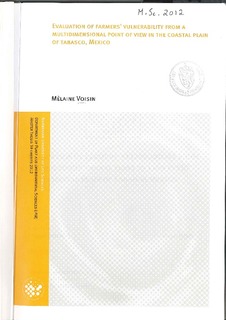Evaluation of farmers vulnerability from a multidimensional point of view in the coastal plain of Tabasco, Mexico
Master thesis
Permanent lenke
http://hdl.handle.net/11250/189643Utgivelsesdato
2013-09-13Metadata
Vis full innførselSamlinger
- Master's theses (IPM) [204]
Sammendrag
The evaluation of agro-ecosystems sustainability requires transforming complex aspects in others, more simple, that permit to point out tendencies at a system level. To do so, indicators are an efficient tool to get a general analysis in the most objective way. The aim of this master thesis was to develop a set of indicators that would evaluate the vulnerability of tropical agro-ecosystems in Tabasco, southeast Mexico. The work took place in two different areas of Tabasco, both in a lagoon context. The analysis was realized at two scales, the community scale and the activity of production scale, according to three dimensions: social, economic and environmental. The indicators showed clear vulnerability tendencies in the two areas of study and between the different activities of production. The vulnerability depended a lot from the contextual factors (geographic isolation, infrastructure, climate pattern, agricultural policies) and structural factors (nature of agricultural activities, governmental authorities, natural resources exploitation). The most isolated communities, of poor infrastructure and rural development plan were clearly the most socially, economically and environmentally vulnerable. The crop and cattle farming, sensitive to pests and diseases and hydric stress, that depend a lot on inputs and soil quality presented real difficulties whereas fishing and alternative productions were not that linked to the soil or natural resources quality and showed relative resilience.
